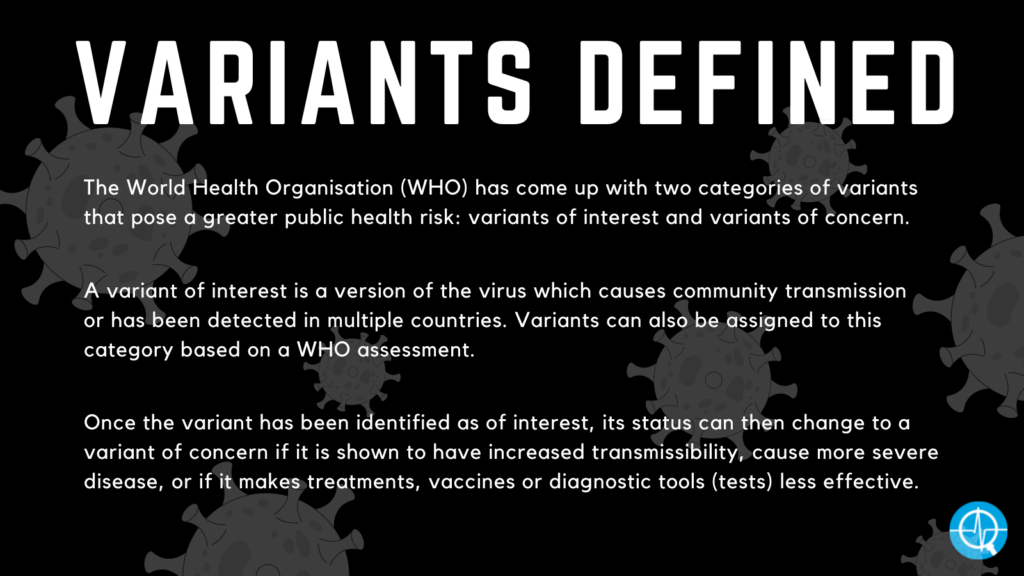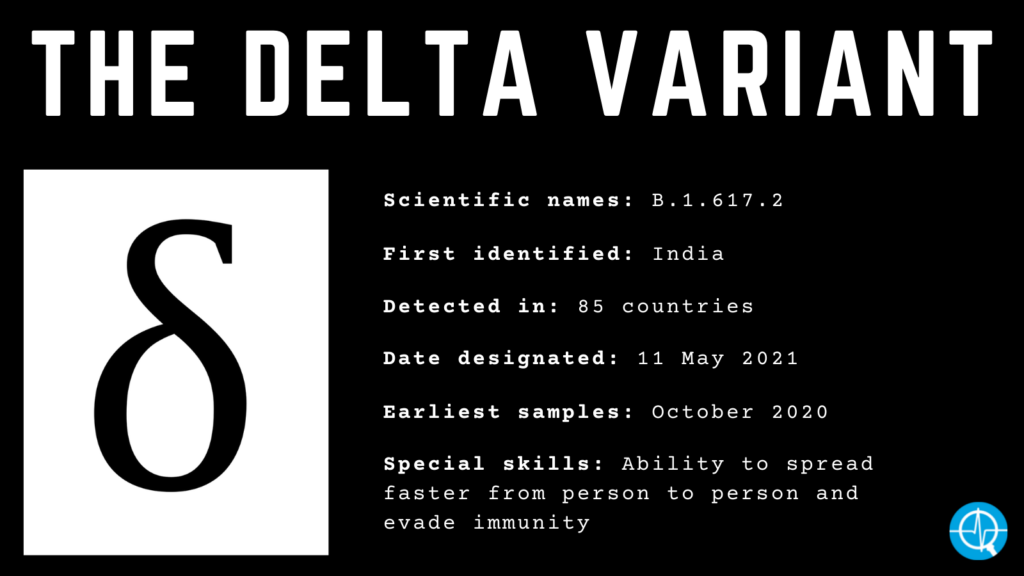- South Africa’s lockdown regulations are tightening in order to better curb the spread of COVID-19.
- This comes amid concerns about a new variant, called Delta, that has been detected in some provinces.
- The Delta variant is the most transmissible form of the SARS-CoV-2 virus identified so far and could drive a surge of infections during the country’s third wave.
South Africa has now increased its lockdown restrictions in an attempt to curb the spread of a new variant, which has now been detected in five provinces, and could begin to dominate the country’s epidemic.
On Sunday night, President Cyril Ramaphosa raised the country’s alert level to adjusted level 4. The new restrictions prohibit all gatherings, bans the sale of alcohol, limits travel in and out of Gauteng and requires schools to close down. The country will remain at this lockdown level for the next two weeks, at which point the measures will be re-assessed.
This follows an announcement by the Acting Health Minister, Mmamoloko Kubayi, on Saturday that the Delta variant (which was first identified in India) has started to spread rapidly in South Africa and was beginning to dominate new infections arising in the county’s third wave, particularly in KwaZulu-Natal and Gauteng. The variant has also been detected in the Western Cape, Eastern Cape and Free State.
The Delta variant — which was initially detected in South Africa in May — is, so far, the most transmissible form of the SARS-CoV-2 virus (the virus that causes COVID-19) in the world, meaning it is able to spread much more efficiently from person to person than other variants.
Here’s what you need to know about the variant.
What is a variant?
Over time viruses undergo small changes in their structure, known as mutations. These are largely insignificant and mostly don’t alter the behaviour of the bug. But occasionally, mutations can affect the way a virus interacts with our bodies and in turn change the trajectory of an outbreak.
Scientists use a technique called genomic surveillance to analyse the mutations and understand what they mean for the virus’s behaviour. In South Africa, there is a network of scientists who have been doing just this since March last year. They unravel the genetic code of the versions of the SARS-CoV-2 virus spreading in the country to establish if new variants have emerged.
For SARS-CoV-2, the World Health Organisation (WHO) has come up with two categories of variants that pose a greater public health risk: variants of interest and variants of concern.

A variant of interest is a version of the virus which causes community transmission or has been detected in multiple countries. Variants can also be assigned to this category based on a WHO assessment.
Once the variant has been identified as of interest, its status can then change to a variant of concern if it is shown to have increased transmissibility, cause more severe disease or if it makes treatments, vaccines or diagnostic tools (tests) less effective.
The Delta variant was initially identified as a variant of interest in April 2021 before being categorised as a variant of concern on 11 May.
What do we know about the Delta variant?
Just over six months ago, South Africa identified its own variant of concern, called Beta. This variant drove the country’s second wave of infections and quickly became the main form of the virus circulating in the country, making up over 90% of all new cases.
Since then, the Beta variant has consistently dominated South Africa’s epidemic — until now. Saturday’s announcement raises concerns that the Delta variant is quickly overtaking other forms of the virus in circulation in the country.
One of the newest to emerge, perhaps the most concerning trait of the Delta variant is its ability to spread at a rapid rate.
The variant was first identified in India where it drove a devastating second wave of COVID infections that peaked in May — with a high of 414 433 new cases on 6 May.
As of 22 June, the Delta variant had spread to 85 countries. Because the variant is still fairly new, scientists are still gathering data to fully understand what its mutations mean.
But for now, one thing is clear: This form of the virus spreads exceptionally fast. As a result, the Delta variant causes a steep rise in new cases.

A June Eurosurveillance report found that the reproductive number (how many other people one infected person can infect) had increased for all variants of concern. This increase varied depending on the variant, from 25% for the Beta and up to 97% for the Delta variant.
When compared to other variants, the Delta ranges from 30% to 60% more transmissible. Due to this, the report estimates that the Delta variant “is expected to rapidly outcompete other variants and become the dominant circulating lineage [globally] over the coming months”.
This is something that’s already been seen in the United Kingdom (UK) where the Alpha variant was first identified last year. Public Health England, of the UK’s health department, began investigating the Delta variant in early April when there were just over 200 cases in the country. Three months later, the variant accounts for almost 95% of cases sequenced in the country.
A similar trend has emerged in KwaZulu-Natal’s COVID outbreak, although far fewer cases have been analysed locally. At the health department’s briefing, Tulio de Oliveira, the director of the KwaZulu-Natal Research Innovation and Sequencing Platform (KRISP), presented data from sequences done by his lab of 68 virus samples from KwaZulu-Natal. This was a random assortment of samples from throughout the province taken in the last week — around 70% of the sequences were the Delta variant. De Oliveira says there was a substantial increase in the variant’s prevalence in KwaZulu-Natal when comparing samples from the past week to previous surveillance done in the province.
The Delta variant has also been detected in the Western Cape, although far fewer samples have been sequenced there. De Oliveira said his lab is currently working on unravelling the genetic code for virus samples received from Gauteng and is expecting to have a better picture of what is happening in the province by Tuesday. So far, there is only sequencing data for travellers infected with the Delta variant who arrived in the country in April. Scientists believe that the variant is likely driving the wave of infections currently spreading in Gauteng.
The Network for Genomic Surveillance in South Africa is currently working around the clock to sequence more samples, as the process is complex and time-consuming. De Oliveira said they are hoping to sequence between 500 to 1 000 samples in the coming week in order to better track the Delta variant’s spread in the country. In the past year, the consortium has sequenced roughly 500 to 600 samples per month.
Can the Delta variant cause more severe disease?
The short answer: It’s too soon to tell.
There is June data from the UK that shows a slight risk for increased hospitalisations in cases where people were infected by the Delta variant when compared to the Alpha variant.
But it is not yet clear whether this increased hospitalisation risk also means that people are more likely to die as a result of infection caused by Delta.
Richard Lessells, who works at KRISP and has been monitoring SARS-CoV-2’s evolution in South Africa, however says that even without the variant’s mutations directly leading to more hospitalisations and deaths, the rate at which it spreads (i.e. its increased transmissibility) drives an increase in hospitalisations (because the variant causes so many more infections).
This will in turn put greater pressure on the country’s hospitals, says Lessells. An overburdened healthcare system could then potentially result in more deaths because of a reduced capacity to care for patients.
What about the risk of re-infection?
Although there is still limited information, current data indicates that people who were previously infected with the Beta variant can still get sick with the Delta variant.
This is cause for concern as until now, the belief has been that the Beta variant should provide enough protection to prevent people from getting re-infected by other variants.
A June paper in the New England Journal of Medicine showed that while people who had been infected by the original strain of the coronavirus were susceptible to re-infection with the Beta variant, the reverse is not true.
The paper looks at a specific immune response, called neutralising antibodies, generated by people who had been infected with the Beta variant during South Africa’s second wave in December. Neutralising antibodies are part of your immune system’s defence and attach themselves to the virus in a way that stops it from infecting your cells.
The researchers found that in a lab setting (which can differ from what is seen in real life) the body’s natural response to the Beta variant — in the form of neutralising antibodies — was able to offer protection against the original form of the virus that had been circulating as well as the Gamma variant, which was first identified in Brazil and has not yet been detected in South Africa.
This suggested that the Beta variant provides a wider form of protection that could potentially also protect people against other variants. This also held promise for future booster vaccines that are being designed based on the Beta variant.
But it seems that there are limitations to how this protection applies to the Delta variant.
A May preprint study found that the Delta variant was able to escape some immune responses generated both by people who had previously been infected with the virus and those who had been vaccinated.
In a lab setting, the paper found that the protection offered by neutralising antibodies from people who had previously been infected was 4 to 6-fold less effective against the Delta variant when compared to the Alpha variant. A similar reduction in protection was also seen when tested against the Beta variant when compared to Alpha.
Another paper shared in a pre-proof from the journal, Cell in June, showed that people who had previously been infected by either the Beta or Gamma variants were likely to be susceptible to re-infection with the Delta variant.
The research found that although people previously infected with the Alpha variant would still have some protection, this was significantly reduced in people who had been infected with the Beta and Gamma variants.
Looking at blood from people who had previously been infected with the Beta variant, the paper says “neutralization is almost completely lost to [the Delta variant] … suggesting that individuals infected with B.1.351 [Beta] and P.1 [Gamma] may be at risk of reinfection”. This lack of protection is likely due to differences in the mutations between the variants.
What does this mean for vaccines?
The relative newness of the Delta variant means there are limits to how much we know about this version of the virus.
One of the biggest questions that needs to be answered is what this means for vaccines.
With the Beta variant, one of its common mutations with Delta, helps the virus evade immunity.
This means that existing COVID vaccines offer less protection against the Beta variant — this was, for instance, seen in the trials for the AstraZeneca and Johnson & Johnson jabs.
Although it is still too early to know if the same pattern will be seen with the Delta variant, there is initial evidence suggesting that the variant does reduce vaccine efficacy.
Data from cases in England showed that the effectiveness of both the Pfizer and AstraZeneca jabs had been lowered after one dose from 51.1% to 33.5%.
But after a second shot, the decline in efficacy was smaller. In those who received the AstraZeneca jab, the efficacy had gone down from 66.1% to 59.8% after a second jab and those who got the Pfizer vaccine saw a drop from 93.4% to 87.9%.
What this shows is that in two-dose vaccines, once people have been fully immunised, it seems that the jabs are still able to offer sufficient protection against the Delta variant.
Whether this could put AstraZeneca back in play for South Africa’s roll-out is not yet clear. The jab was benched earlier this year after results from a local trial showed that the Beta variant had significantly reduced its efficacy to the point where it would no longer provide sufficient protection against the virus in South Africa. The vaccine was approved by the country’s medical regulatory authority, Sahpra, at the beginning of the year which means that the jab would not need to submit an application for review prior to use should it be put back into the roll-out ring.
The effectiveness of a one-dose vaccine such as Johnson & Johnson (J&J) against the Delta variant has not yet been determined. These kinds of answers can only be found in populations that have both been vaccinated with the J&J jab and also have a high prevalence of the Delta variant — data which for now doesn’t exist.
Since the J&J vaccine has been given to just under 500 000 healthcare workers in South Africa’s Sisonke study, and a further 500 000 doses are allocated for teachers, it is likely that South Africa may be able to begin gathering its own data on the jab’s effectiveness against the Delta variant over the course of the next few months.
Rising concern about variants means that while increased vaccinations are important, we also cannot abandon existing public health measures designed to limit the spread of the virus, such as wearing masks and physical distancing.
In a briefing held on Friday, WHO Director-General Tedros Adhanom Ghebreyesus warned:
“New variants are expected and will continue to be reported – that’s what viruses do, they evolve – but we can prevent the emergence of variants by preventing transmission.
It’s quite simple: more transmission, more variants. Less transmission, less variants.
That makes it even more urgent that we use all the tools at our disposal to prevent transmission: the tailored and consistent use of public health and social measures, in combination with equitable vaccination.”
Aisha Abdool Karim was a senior health reporter at Bhekisisa from 2020 to 2022.




